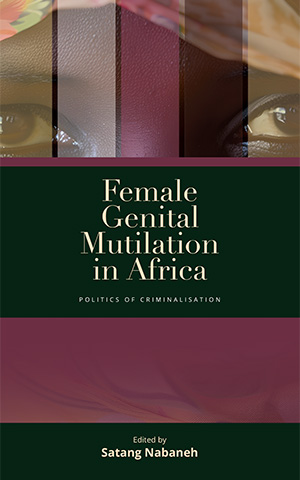Open Access

Female genital mutiliation in Africa: Politics of criminalisation
Edited by Satang Nabaneh
2025
ISBN: 978-1-0672371-9-6
Pages: 404
Print version: Available
Electronic version: Free PDF available
About the publication
Despite global criminalisation efforts, with over 60 countries, including more than 25 in Africa, adopting laws, Female Genital Mutilation (FGM) persists, devastating the lives of millions of women and girls and exposing the limits of current legal frameworks. In Female Genital Mutilation in Africa, editor Satang Nabaneh curates a timely and crucial collection, illustrating the complex history of colonial legal imposition and the evolving post-colonial resistance, while challenging dominant narratives. Through an intersectional, African feminist, and decolonial lens, this book ignites a vital cross-boundary (disciplinary, national, ethnic and religious) dialogue on the adequacy of criminal law in addressing FGM. Contributors offer theoretical, practical, and survivor perspectives, providing context-specific analyses that calls on advocates, policymakers, legislators, scholars, and students to rethink human rights and the use of criminal law, pertaining to issues of women and girls, both in Africa and globally.
“This collection is a significant and timely contribution to the field, offering a rigorous examination of the complex legal landscape surrounding FGM in Africa … The resurgence of debates around ‘decriminalisation’ in some African countries underscores the urgent need for sustained vigilance and robust legal protections to safeguard the rights of women and girls.”
Janet Ramatoulie Sallah-Njie
Vice Chairperson & Special Rapporteur on the Rights of Women in Africa,
African Commission on Human and Peoples’ Rights
“This compelling book offers a vital examination of law’s role in combatting FGM. It compels us to ask: why and how do we legislate? As the chapters powerfully demonstrate, our aim must be to protect victims, not merely abolish a harmful practice.”
Kembo Takam Gatsing Hermine
Member of the African Committee on the Rights and Welfare of the Child
& Special Rapporteur on Child Marriage and other Harmful Practice
Table of Contents
Preface
Endorsements
Acknowledgments
Contributors
List of acronymns and abbreviations
1 Beyond legislation: Examining the efficacy of criminalisation of female genital mutilation in Africa
Satang Nabaneh
PART I: Female genital mutilation: Unpacking the cultural context
2 Developing home-grown approaches in eradicating female genital mutilation across communities in Africa
Folashade Rose Adegbite
3 The disabled genitalia: Countering dominant narratives to ending female genital mutilation in Africa
Adetokunbo Johnson
4 Research and female genital mutilation prevention: Evidence from Africa
Angela J Dawson
PART II: Ethics, law and criminalisation
5 Medicalisation of female genital mutilation/cutting: Ethical dimensions
Samuel Kimani
7 Eradicating undesirable cultural or religious practices through criminalisation: The need for equity in the case of body modification surgeries
Godfrey B Tangwa
PART III: Survivor narratives and feminist perspectives
8 Re-telling the experiences of African women with female genital mutilation through an African feminist lens
Agnes Meroka-Mutua
9 Female genital mutilation: A survivor’s narrative
Musu Bakoto Sawo
PART IV: Legal cases and societal responses
10 The curse of beyond reasonable doubt
Kenneth K Mbaabu
11 Should female genital mutilation be decriminalised in Nigeria? An empirical justification from statutory and religious perspectives
Mariam A Abdulraheem-Mustapha
13 Female genital mutilation/cutting and the politics of cultural relativism
Farnoosh Milde
